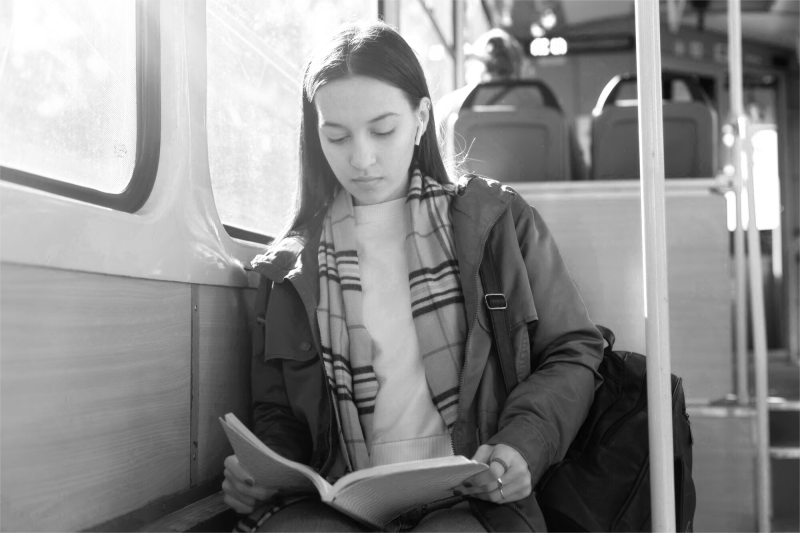In today’s fast-paced world, commuting to work is a constant challenge. Traveling from home to work, whether by car, bus, train, or bike, frequently depletes energy and productivity. A taxing commute wears you out even before your workday begins. Similarly, a lengthy trip home after work can hinder relaxation.
However, this need not be true. With the proper attitude, commuting can transform into a period of relaxation and imaginative thinking. Rather than losing hours, it can be an opportunity to gain more of them for personal development.
Straightforward, evidence-based techniques can help transform commute into something beneficial. By practicing mindfulness, consuming inspirational material, or participating in minor creative activities, you can make your commute more impactful.
Learn how minor adjustments can lead to a significant impact. A creative commute can make you feel revitalized, motivated, and prepared for the day. Read below to learn more!
Why your commute feels like wasted time
For numerous professionals, commuting is an inescapable aspect of their everyday routine, but it frequently seems frustrating and unproductive.
Whether caught in traffic, jammed into a packed train, or facing lengthy delays, these times can feel like wasted hours — neither relaxing nor fruitful. The feeling of time squandered arises from the absence of control, inactive anticipation, and the monotonous quality of the experience.
Grasping the reasons commuting seems unproductive will give you a deeper insight into this, and inform you of methods to enhance the value of this time.
The daily grind of commuting
Many people know that getting to work is part of the daily grind. However, it often feels more annoying than anything else. Making the same trip daily can feel like a mindless, wasteful routine.
Spending too long stuck in traffic or dealing with unexpected delays can be physically and mentally tiring. Instead of arriving at work feeling refreshed and ready to tackle the day, many commuters end up worn out, and by the time they get home, they’re so beat that they don’t even want to do anything for themselves.
The mental toll of an unstructured commute
Dealing with a chaotic commute can really throw you off and mess with your mood.
It’s annoying not knowing if you will get stuck in traffic, if the train will be late, or if plans will suddenly change. Those packed buses and crowded subways just add to the stress. When you can’t control how your commute goes, it feels like you’re just wasting time.
Over time, this daily hassle can drain your energy, kill your motivation, and even push you toward burnout, which isn’t good for your job or well-being.
Reframing your commute as an opportunity
Instead of seeing your commute as a waste of time, view it as a chance to grow both personally and professionally. Whether you are stuck in traffic or on the bus, this time can help clear your head, think about your goals, or spark creative ideas.
Shifting your perspective on commuting can make a big difference. Using this time for something purposeful creates a helpful link between work and home life. This approach reduces stress and boosts productivity.
Read more: Tips for a Productive Commute Time
Using your commute to be more relaxed and creative
How you utilize your commute can significantly affect your mood, productivity, and general well-being. Rather than allowing this period to sap your energy, implementing practical, research-supported methods can make you feel more at ease and even enhance your creativity.
To fully optimize the advantages of your commute, you need more than mere good intentions; you must use techniques based on psychology, neuroscience, and productivity studies.
Recognizing how various activities affect mental health and creativity can make your commute a revitalizing and productive experience. Here are some of the best ways to have a more creative commute.
Mindfulness and meditation techniques
Integrating mindfulness and meditation into your travel routine can lower stress, boost concentration, and improve overall health. In a loud setting, easy methods can provide a feeling of peace and clarity to your experience.
Here are simple exercises that can be followed:
- Mindful breathing. Concentrate on deep, slow breaths: inhale for four counts, hold for four, and exhale for four. This method soothes the nervous system and lowers stress levels.
- Body scan meditation. Focus on various areas of your body, beginning with your toes and progressing upwards. This aids in relieving physical tension and encourages relaxation.
- Sensory engagement. Rather than drifting away, pay attention to your senses — observe the sounds, visuals, and even the sensation of your seat or the pace of your movements. This helps you stay in the moment and centered.
Listening to inspiring and educational content
Transforming your commute to work into an opportunity for education and motivation can enhance productivity and enjoyment. Whether you seek relaxation, creativity, or learning, the right content can elevate your journey into a meaningful experience.
- Audiobooks. Nonfiction works on personal growth, business, or psychology can offer new perspectives. Your favorite fiction genre can help alleviate stress and spark creativity.
- Podcasts. Informative podcasts covering science, history, or personal development can transform your journey into an educational experience. Podcasts centered on motivation or mindfulness may also create an uplifting atmosphere for the day.
- Music. Soothing instrumental playlists, classical compositions, or sounds of nature help alleviate stress, whereas lively or cinematic scores can enhance energy and motivation.
Read more: Conscious Entertainment: Balancing Productivity and Recreation
Journaling or voice recording ideas
Traveling to work provides a great chance to seize transient ideas and bursts of creativity. Use a notebook or a voice memo app to convert idle moments into fruitful brainstorming periods.
Here are some suggestions on how to do that:
- Notebook journaling. Maintain a compact notebook or utilize a note-taking application to record your thoughts, tasks, or insights. Handwriting can enhance memory retention and foster creative thinking.
- Voice recording applications. When you’re on the road or can’t jot things down, applications such as Otter.ai, Google Keep, or Evernote enable you to capture voice notes without using your hands, ensuring that your thoughts are saved for future reference.
Want a bit of help? Here are some journaling questions to inspire creativity while traveling:
- What’s a fresh concept I wish to investigate today?
- What challenge am I encountering, and what are some potential remedies?
- If I could offer my future self a single suggestion, what would it be?
- What’s one thing I appreciate at this moment?
Sketching, doodling, or writing on the go
Participating in minor creative tasks while traveling can spark innovative thoughts and offer a mental respite from everyday pressures.
- Drawing and doodling. Drawing, even just basic doodles, can stimulate various areas of the brain, boosting problem-solving abilities and creative thought. Use apps like Procreate, Adobe Fresco, or Paper.
- Writing activities. Engaging in freewriting or quickly noting a few sentences regarding an idea, observation, or character description can assist in overcoming creative hurdles. You can use an analog journal, or even just your smartphone.
Many apps and resources can help spark creativity during your commute. Whether you prefer jotting down ideas, listening to inspiring content, or engaging in small creative tasks, the right tools can make your travel time more productive.
Making your commute a time for personal growth
A mindset shift can transform commuting from a frustrating necessity into an opportunity for self-improvement. Instead of seeing commuting as wasted time, view it as an investment in personal growth.
For example, during your commute, you can set small learning goals on a subject you care about. You don’t need an expensive course; just use free apps or videos online. Also, set achievable goals, so you won’t feel pressured.
For example, if you want to learn a language, you can use the following apps:
- Duolingo
- Blinkist
- Babbel
For bite-sized learning sessions across a variety of topics, check these out:
- Duolingo
- Blinkist
- TED Talks
Remember, don’t dive too deep, too fast. Break larger goals into smaller, manageable tasks (e.g., learning five new words in a language, reading one article, or brainstorming one new idea per commute).
By intentionally using commute time for self-development, you can turn a routine part of the day into a meaningful and productive experience.
In conclusion
Your everyday commute doesn’t need to be a burden. Rather than viewing it as merely a dull segment of your day, consider transforming it into an excellent opportunity to relax, unleash your creativity, or focus on self-improvement.
This article explores simple yet effective methods to enhance your travel time. By altering your mindset and incorporating beneficial habits, your commute can become an enjoyable and fruitful part of your day.
Transform your daily commute or journey into a chance for motivation, education, and self-improvement.
If you want to see more resources on productive commute, check out the Personal Productivity Science Labs. The lab uses the research of the Institute for Life Management Science to produce courses, certifications, podcasts, videos, and other tools. Visit the Personal Productivity Science Labs today.
Photo by Freepik



